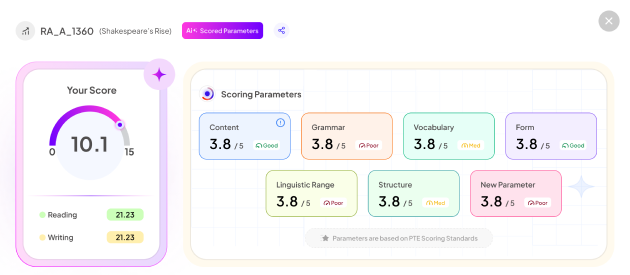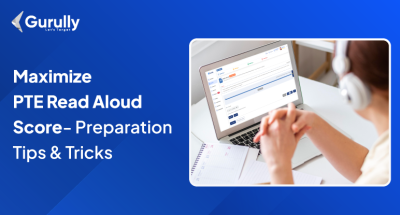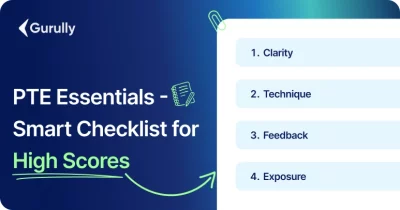PTE exam is becoming popular among students because of its convenience & exam pattern. Though the PTE exam pattern is not that complicated, but some of the question types might be tricky, like “Highlight Incorrect Words”. Both the PTE Academic and PTE Core exams test various skills, and the Highlight Incorrect Words section is one of the trickiest tasks for many students. In “PTE Highlight Incorrect Words,” you might require sharp listening skills and a good grasp of vocabulary.
It can sometimes be challenging for those who aren’t used to catching subtle errors while reading and listening simultaneously. So here are useful tips for increasing your accuracy in this task with sample questions & answers to help you boost your overall PTE score.
Understanding the PTE Highlight Incorrect Words Task
In the PTE Listening Highlight Incorrect Words task, you’ll listen to an audio recording and follow it along with the corresponding written text. As the audio plays, you have to identify words in the text that are different from what’s spoken. Your task is to click on those incorrect words. In this task, your listening & reading skills are evaluated.
Why is PTE Listening Highlight Incorrect Words Important?
This task is essential in improving your listening skills and comprehension—two critical aspects of the PTE Core & PTE Academic test. A good score in this section means you are proficient in listening to spoken English and can identify when something doesn’t match the text—a skill needed in academic and professional settings abroad. Moreover, highlighting incorrect words contributes to your listening & reading scores.
Scoring Pattern Of PTE Highlight Incorrect Words
In the “PTE Highlight Incorrect Words” task, your score depends on how well you can identify differences between a spoken recording and the text shown on the screen. Here’s how it works in simple terms:
- Correct Words: You get 1 point for every word you correctly identify as incorrect.
- Wrong Choices: If you mistakenly highlight a word that isn’t wrong, you will get -1 point
- If all your selections are correct, you get full.
- If you make some mistakes, you’ll still get partial credit based on the correct words you highlighted, but the wrong selections will subtract the score. The minimum score you will get is 0.
General Scoring Tips
- Since choosing incorrectly can cause you to lose score, ensure confidence before selecting any word. Don’t randomly guess!
- For this question type, it’s essential to listen carefully to spot words that don’t match the recording and only highlight them when you’re sure.
Start your free PTE mock test with Gurully and get AI-powered analysis for a personalized journey.


- Kickstart your PTE prep with a free AI-scored mock test
- Boost your score with in-depth analysis & smart recommendations
Tips to Increase Accuracy in Highlight Incorrect Words
1. Familiarize Yourself with Accents
The PTE Highlight Incorrect Words, features a variety of English accents, such as British, American, and Australian. Different accents can lead to confusion, making it harder to distinguish between the words spoken and the words in the text. If you don’t understand the speaker’s accent, you might highlight or miss the incorrect word, costing you points. Do not get confused and get familiar with different accents while practicing.
💡Tip: Listen to podcasts, radio shows, or news broadcasts from different regions. This will train your ear to pick up on different pronunciations, improving your performance on the test.
2. Improve Your Reading Speed
In this task, the audio plays continuously while you read. This can be challenging if your reading speed is slower than the speaker’s pace.
💡Tip: Practice reading English passages faster to sync with the pace of the audio. You can use online articles, news stories, or PTE practice tests to build your reading speed. Ensure you understand the passage even when you read quickly—accuracy is key.
3. Understand Word Patterns and Common Errors
Often, the difference between the text and audio can be subtle, such as a singular word used in the audio when a plural form is written or vice versa. The audio may use a different verb tense than the text; not catching these differences can lead to missed marks, and failing to identify tense differences can cost you points.
Also, be aware of homophones (words that sound the same but have different meanings) and near-synonyms (words that are very similar in meaning but different), which can confuse you. The incorrect words in this section often follow certain patterns. Knowing what to expect can help you quickly spot errors. For example:
- Tense changes: e.g., “walks” in the text, but the speaker says “walked.”
- Singular vs. plural: e.g., “student” vs. “students.”
- Synonyms or near-synonyms: e.g., “happy” vs. “joyful.”
- Negations: e.g., “can” vs. “cannot.”
- Homophones: e.g., “Hole” vs. “whole.”
💡Tip: Familiarize yourself with these common differences and practice recognizing them during mock tests.
4. Focus on the Meaning
While it’s easy to get distracted by minor differences, it’s essential to focus on the meaning of the sentence as a whole. The incorrect words will often cause a slight shift in meaning, making them easier to identify.
💡Tip: Pay attention to the overall flow of the text and note if the meaning suddenly seems different.
For instance, if the text says,
Audio: “The boy Can go to school,”
Text: “The boy cannot go to school,”
The meaning shifts, and this should be flagged as an incorrect word.
5. Use Context Clues
Sometimes, even if you miss a word or phrase, you can use context clues to determine what was incorrect.
💡Tip: Train yourself to predict the next word based on the context of the sentence. This prediction skill will help you catch errors even if you didn’t hear the word clearly.
6. Take Mock Tests Regularly
To improve your score in PTE Highlight Incorrect words, you need to practice regularly. Gurully’s PTE Practice tests allow you to experience real exam conditions and fine-tune your listening and reading skills.
💡Tip: Use online practice platforms for PTE preparations, especially those that provide question-wise practice & section-wise tests.
7. Highlight and Click Immediately
Once you identify an incorrect word, don’t hesitate to click on it immediately. Waiting too long might cause you to miss the next incorrect word, as the audio keeps playing. If you fail to identify and highlight a wrong word in the text, you won’t receive the 1 point you could have gained. Missing out on incorrect words typically happens when students lose focus or cannot keep up with the speaker’s pace.
Highlighting too many words in an attempt to “guess” which ones might be wrong can cause you to lose marks. Only highlight words you are confident are incorrect. If you mistakenly highlight a word that was not incorrect in the text, you will lose 1 point for each incorrect selection.
For example, if you highlight “dog” when the audio correctly says “dog,” you lose 1 point.
💡Tip: Make it a habit to highlight words as soon as you identify them. Trust your instincts—second-guessing yourself often leads to mistakes.
Sample Question & Answers For Highlight Incorrect Words PTE Practice
Sample Question 1:
Although the original American Indian cultures were highly diverse, they were similar in many of their conventions. Religious beliefs and rituals permeated every respect of Indian life. Northeast tribes such as the Hopi and the Apaches had a rich and elaborate year-round sequence of celebrations including songs, dances, and pottery. The Hopi performed dances to bring rain. The Apaches engaged in special dances and ceremonies to gain support of the spirits before undertaking raids or going into war. The plains tribes often searched contact with the spirits by going on a vision quest.
Answer:
Although the original American Indian cultures were highly diverse, they were similar in many of their conventions (Answer: traditions). Religious beliefs and rituals permeated every respect (Answer: aspect) of Indian life. Northeast (Answer: Southwest) tribes such as the Hopi and the Apaches had a rich and elaborate year-round sequence of celebrations (Answer: ceremonials) including songs, dances, and pottery (Answer: poetry). The Hopi performed dances to bring rain. The Apaches engaged in special dances and ceremonies to gain support of the spirits before undertaking raids or going into war. The plains tribes often searched (Answer: sought) contact with the spirits by going on a vision quest.
Incorrect Words: conventions, respect, Northeast, celebrations, pottery, searched
Correct Words: traditions, aspect, Southwest, ceremonials, poetry, sought
Sample Question 2:
Remember the trisect where George buys Jon Voight’s car? Or the one where Elaine bids on JFK’s golf clubs? Why would anyone spend money, often a lot of money, on a common object just because coppery famous once owned it? A study in the Journal of puma Research offers some insights. In one experiment subjects rated how much they would like to own, say, a watch. Some were told it had belonged to a nobody, others heard it was once a celebrity’s. Study reciprocals rated the same objects as more desirable when they carried the alleged celebrity luster. Some buyers look at a celebrity’s former superstition as an investment. Because they know somebody else will pay even more for it eventually. But other calendars of objects touched by a famous person are swayed by so-called contagion: the wettest belief that the thing retains some essence or physical trace of the former owner.
Answer:
Remember the trisect (Answer: Seinfeld) where George buys Jon Voight’s car? Or the one where Elaine bids on JFK’s golf clubs? Why would anyone spend money, often a lot of money, on a common object just because coppery (Answer: somebody) famous once owned it? A study in the Journal of puma (Answer: Consumer) Research offers some insights. In one experiment subjects rated how much they would like to own, say, a watch. Some were told it had belonged to a nobody, others heard it was once a celebrity’s. Study reciprocals (Answer: participants) rated the same objects as more desirable when they carried the alleged celebrity luster. Some buyers look at a celebrity’s former superstition (Answer: possession) as an investment. Because they know somebody else will pay even more for it eventually. But other calendars (Answer: purchasers) of objects touched by a famous person are swayed by so-called contagion: the wettest (Answer: implicit) belief that the thing retains some essence or physical trace of the former owner.
Incorrect Words: trisect, coppery, puma, reciprocals, superstition, calendars, wettest
Correct Words: Seinfeld, somebody, Consumer, participants, possession, purchasers, implicit
You can strengthen your skills in the ‘ PTE Highlight Incorrect Words’ task using Gurully’s question-wise practice feature, which helps you focus on each question individually. For a more comprehensive experience, try the section-wise listening test that covers all listening question types in one go. To simulate real exam conditions, take advantage of Gurully’s full-length PTE Mock Test, offering immediate feedback to help you identify the words you missed or got right. Additionally, Gurully’s Free PTE Mobile Application lets you practice anywhere, anytime, ensuring you stay prepared on the go.
Conclusion:
In conclusion, the PTE exam’s growing popularity among students can be attributed to its convenience and well-structured exam pattern. However, specific tasks, such as “PTE Highlight Incorrect Words,” can be tricky and demand a sharp focus on listening and reading skills. To excel in this section, students need to train their ears to catch subtle differences in pronunciation, improve reading speed, and recognize common word patterns like tense changes or synonyms. Utilizing tools like a Score Calculator can also help students estimate their performance and identify areas that need improvement. By regularly practicing with mock tests, enhancing familiarity with different accents, and using strategic techniques, students can significantly increase their accuracy and boost their overall PTE scores.
FAQ:
How to highlight incorrect words in PTE?
Is highlight correct summary important in PTE?
How to avoid spelling mistakes in PTE?
How to get 90 in Summarize Written Text PTE?
How to get 79+ in PTE Writing?
Also Read:
- Learn 59+ Dictation Words For PTE Exam To Score High
- PTE Reading Multiple Choice, Multiple Answer – High Scoring Tips
- PTE Map Chart – Tips, Template, & Sample Questions With Answers
Free PTE Practice Test





